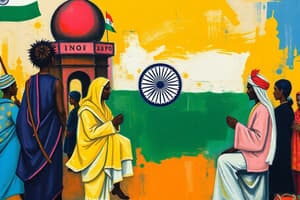Podcast
Questions and Answers
What does 'secular' mean in the context of the Indian Constitution?
What does 'secular' mean in the context of the Indian Constitution?
- Being biased towards a specific religion
- Encouraging discrimination based on religion
- Imposing a state-mandated religion
- Maintaining neutrality towards religions (correct)
What fundamental right is guaranteed by the Indian Constitution related to religion?
What fundamental right is guaranteed by the Indian Constitution related to religion?
- Right to freely profess, practice, and propagate religion (correct)
- Right to favor one religion over others
- Right to impose religious beliefs on others
- Right to discriminate based on religion
How does the concept of freedom of religion protect individuals according to the Indian Constitution?
How does the concept of freedom of religion protect individuals according to the Indian Constitution?
- By ensuring personal liberty in spiritual beliefs (correct)
- By favoring discrimination based on religious beliefs
- By allowing coercion in religious matters
- By promoting state-imposed religious practices
What role does secularism play in shaping the political landscape of India?
What role does secularism play in shaping the political landscape of India?
How does a secular state govern its relations with religious institutions according to the Indian Constitution?
How does a secular state govern its relations with religious institutions according to the Indian Constitution?
What distinguishes a secular state from a non-secular state according to the Indian Constitution?
What distinguishes a secular state from a non-secular state according to the Indian Constitution?
What was the aim of adding the term 'secular' to the Indian Constitution?
What was the aim of adding the term 'secular' to the Indian Constitution?
What was a significant step taken by the Indian Constitution to address religious tensions?
What was a significant step taken by the Indian Constitution to address religious tensions?
Which Amendment to the Indian Constitution solidified the commitment to secularism?
Which Amendment to the Indian Constitution solidified the commitment to secularism?
What ongoing challenge is highlighted in debates about the Constitution?
What ongoing challenge is highlighted in debates about the Constitution?
Why is ongoing vigilance required in the relationship between religion and politics?
Why is ongoing vigilance required in the relationship between religion and politics?
What is the primary goal of fostering a climate of tolerance and respect for diverse religious traditions?
What is the primary goal of fostering a climate of tolerance and respect for diverse religious traditions?
Flashcards are hidden until you start studying
Study Notes
Secularism in Indian Constitution
The Indian Constitution is notable for its secular stance, which serves to maintain a balance between the diverse religious communities within the country. While the concept of secularism has evolved through various stages in India, it is a key feature of the Indian Constitution and plays a critical role in shaping the nation's political landscape.
Secularism vs. Religion
In the context of the Indian Constitution, "secular" refers to the act of being free from bias towards any specific religion or religious practice. The concept rejects the idea of a state-imposed religion and aims to ensure equality for all individuals regardless of their religious beliefs, fostering mutual respect and harmony among different religious groups.
Freedom of Religion
Freedom of religion is a fundamental right guaranteed by the Indian Constitution, ensuring that individuals can freely profess, practise, and propagate their respective religions without discrimination. This principle aims to protect the personal liberty of each individual, allowing them to make informed choices about their spiritual beliefs without fear of coercion from the state.
Secular State Governance
A secular state, according to the Indian Constitution, maintains neutrality in its relations with religious institutions and organizations. It neither promotes nor hinders any particular religion, treating them all equally. This approach aims to foster a climate of tolerance and respect for diverse religious traditions, preventing the potential abuse of religion for political gain or manipulation.
Evolution of Secularism in India
The evolution of secularism in India can be traced back to the pre-independence era when religious tensions often led to divisive politics. Post-independence, the Indian Constitution was crafted to address these issues, aiming to create a more inclusive framework that accommodates the diverse religious traditions within the country.
Despite early concerns about the inclusion of the term "secular" in the preamble, it was eventually added during the 42nd Amendment of the Constitution introduced by Prime Minister Indira Gandhi. This addition further solidified the commitment to secularism as a core value of the Indian state.
Challenges and Controversies
While the Indian Constitution represents a significant step towards a more tolerant and pluralistic society, controversies and challenges persist. Debates surrounding the removal of certain phrases like "secular," "socialist," and even "democratic" from the Constitution highlight ongoing tensions around the interpretation and implementation of these principles. Additionally, the relationship between religion and politics continues to evolve, requiring ongoing vigilance to ensure that the fundamental values of secularism are preserved and upheld in accordance with the Constitution.
Studying That Suits You
Use AI to generate personalized quizzes and flashcards to suit your learning preferences.




